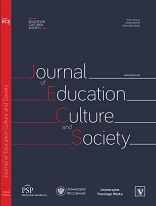PRAGMATIC ASPECT OF WITTGENSTEIN’S PHILOSOPHY OF EDUCATION: A MODERN INTERPRETATION
PRAGMATIC ASPECT OF WITTGENSTEIN’S PHILOSOPHY OF EDUCATION: A MODERN INTERPRETATION
Author(s): Andrii SynytsiaSubject(s): Philosophy, Education
Published by: Fundacja Pro Scientia Publica
Keywords: philosophy of education;Wittgenstein’s pedagogical method;pragmatism
Summary/Abstract: Aim. The aim of the study is to analyse the basic philosophical ideas proposed by Ludwig Wittgenstein in education from the pragmatic standpoint. Methods. The article is based on an extended literature review, which involves the use of such methods as interpretation (to explain incomprehensible and incomplete aspects of philosophical theory), comparative analysis (to compare Wittgenstein’s views with the views of pragmatists) and historico-philosophical reconstruction (to build a complete pragmatico-analytic conception of Wittgenstein’s philosophy of education). Results. The study clarified the pragmatic aspect of Wittgenstein’s reasoning about education. The author reconstructed and critically comprehended the features of Wittgenstein’s pedagogical method, his views on the purpose and characteristics of learning, communication in the educational environment and the results of the pedagogical process. Conclusion. Wittgenstein developed an original pedagogical method, which was a synthesis of his theoretical and practical generalisations based on personal experience of teaching and learning. He supplemented them with pragmatic ideas, which were both his own developments and the result of improving the ideas of pragmatic theory. This made it possible to form the basis of the pragmatico-analytic philosophy of education and to reinterpret its basic principles and ideas.
Journal: The Journal of Education, Culture, and Society
- Issue Year: 11/2020
- Issue No: 2
- Page Range: 39-51
- Page Count: 13
- Language: English

